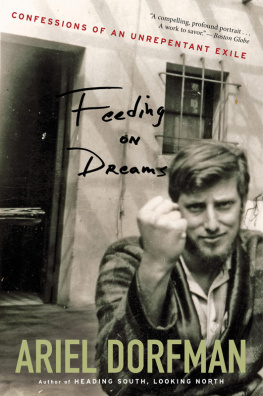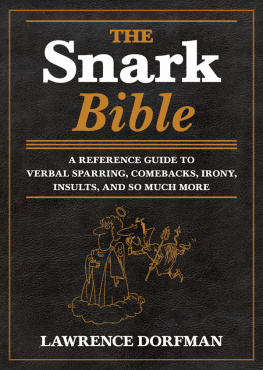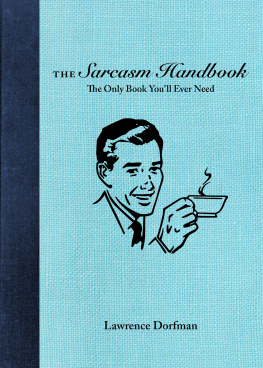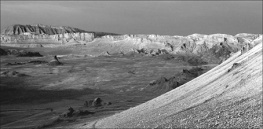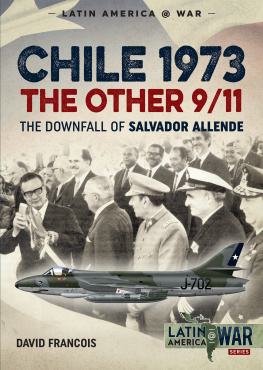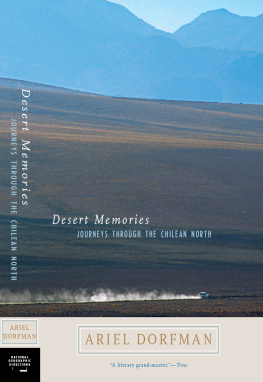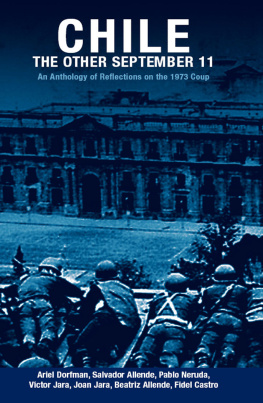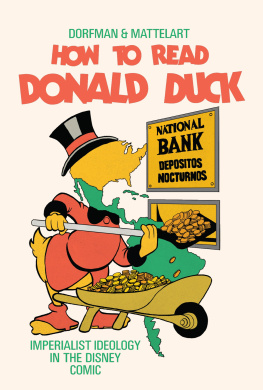First Mariner Books edition 2012
Copyright 2011 by Ariel Dorfman
All rights reserved
For information about permission to reproduce selections from this book, write to Permissions, Houghton Mifflin Harcourt Publishing Company, 215 Park Avenue South, New York, New York 10003.
www.hmhbooks.com
The Library of Congress has cataloged the print edition as follows:
Dorfman, Ariel.
Feeding on dreams : confessions of an unrepentant exile / Ariel Dorfman.
p. cm.
ISBN 978-0-547-54946-0
ISBN 978-0-547-54946-0
1. Dorfman, Ariel. 2. Authors, Chilean20th centuryBiography.
3. Authors, ExiledUnited StatesBiography. I. Title.
PQ 8098.14. O 7 Z 467 2011
863dc22
[B] 2010049803
e ISBN 978-0-547-54947-7
v3.1117
Lines from Dante Alighieri's Divine Comedy, Volume 3 and Volume 4, translated by MarkMusa. Copyright 1997 by Mark Musa. Reprinted with permission of Indiana University Press. Line from "Concerning the Label Emigrants" by Bertolt Brecht. Copyright 1997 from Bertolt Brecht Poems, 19131956 by Bertolt Brecht. Reproduced by permissionof Taylor and Francis Group, LLC, a division of Informa plc. Lines from "Ode to FedericoGarcia Lorca" by Pablo Neruda, translated by Donald D. Walsh, from Residence on Earth,copyright 1973 by Pablo Neruda and Donald D. Walsh. Reprinted by permission ofNew Directions Publishing Corp.
This book is for Anglica.
I know how men in exile feed on dreams.
Aeschylus
A Note about Time and Exile
P ERHAPS IT was inevitable. Because I have lost my country three times in the course of one lifetime, the attempts at self-scrutiny that habitually accompany human existence have, in my case, been forced to grow and ripen through the fragmentation of many arrivals, returns, and departures, complicating the natural intricacies that every exercise in remembering, every memoir, already faces. Life may unfold chronologically for the body and for bureaucracies that keep track of such things as births, marriages, deaths, visas, tax returns, expulsions, and identity cards, but memory does not play this game in quite the same way, always manages to confound the desire for tidiness. And so, for readers who might feel perplexed as they accompany the protagonist in his struggle to find a way in and out of a labyrinth of recollections, a timeline, fixing the major events into a semblance of order, has been added at the end of this book. I don't necessarily recommend that readers consult that chronology. But how could I, of all people, deny to those who wander in the desert a stable glimpse of stars that can perhaps guide them to a safe haven?
Introduction
A S A CHILD , I would often dream of surviving my own death.
Lying there alone in the dark, I'd imagine what it would be like to watch my body stretched out on a bed, and everyone so sad, and all the while I'd be invisibly nearby, eager to jump out from the other side of immortality. Gone from this world for just a few hours and then mischievously alive again, ready to witness the bewilderment of the living when I'd resurrect, Hey, look at me.
Of course, when the opportunity finally did arise, when the day came many decades later and I heard a voice tell me that I was dead, that according to a newswire my body had been discovered that day, September 12, 1986, in a ditch on the outskirts of Santiago, hands tied behind my back and throat slit, it turned out that to witness my own death was less amusing than my childhood fantasies had anticipated.
Not that the news itself was that surprising. After all, I had been returning on and off to hazardous, dictatorial Chile for three years, ever since the military had allowed me back in 1983 after a decade in exile; so anything and everything could have happened to me there, but not now, not now that I was teaching a semester at Duke University in Durham, North Carolina, safely ensconced in the office where the reporter from United Press International had tracked me downcould I comment, please, on the fact that I had died?
"The reports of my death," I said to him, "have been greatly exaggerated."
A moment after I'd delivered that deliciously absurd sentence of Mark Twain's, I began to feel sick. The humor had put a cautious, witty distance between myself and somebody else's death, and postponed the need to ask the question: If I hadn't been murderedat least not yetthen whose throat had been slit in that ditch in Santiago?
I learned the answer soon enough, but first had to respond to another telephone callfrom my mother in Buenos Aires, desperate because she'd been contacted by some callous journalist seeking a statement on her son's assassination. Having reassured her that I was very much alive, my thoughts went out to another mother; there had to be a woman in Chile who could not explain away that killing, a woman who was at that very moment overwhelmed with grief, a woman, a wife, a sister. I had been infected enough by recent history to know that in times of tyranny it is mostly the men who do the dying and the women who do the mourning.
Somebody real had died in Santiago.
His name was Abraham Muskatblit.
On September 7, 1986, just five days before that macabre telephone call, a small ultra-left guerrilla commando had come within inches of slaying Chile's dictator, General Augusto Pinochet. A massive and peaceful movement in opposition to Pinochet had been growing in strength, and the military took advantage of that attack to clamp down on dissidents of all stripes.
As I watched the repression unfold from afar, my weird hope was that my friends in Chile would be taken to prison, the only safe place in a country where men in ski masks, bent on revenge, were breaking down doors and kidnapping citizens. By the afternoon of September 8, bodies began to turn up all over Santiago.
Among the dead was Pepe Carrasco. I had taught him the delights of DonQuixote at the University of Chile when he had been one of my students in the early sixties. Though he had afterwards abandoned literature for the more urgent career of journalism, we had not lost contact, nor our shared love for Cervantes. In fact, when we'd managed to meet the few times I'd been able to visit Chile since 1983, I would jokingly call him Sansn, an allusion to another Carrasco, the barber in the Quixote.
"Sansn, Sansn," I had called out one afternoon in Santiago a few months before he was executed, when I'd noticed him at the edge of a crowd that had gathered for the funeral of a student killed by the police. Pepe was accompanied by two sons just arrived from Mexico, where the family had been exiled. "This is the man," he said to them, pointing at me, "who taught me to tilt at windmills." The extent of our last conversation. Tear gas and batons broke up the throng of mourners, but I'd managed to send a farewell gift to Pepe Carrasco, the same words for everybody in Chile those days: Cudate,Sansn. I asked my friend to take care of himself.
As if by pronouncing those syllables, naming the danger, we could conjure it away.
Now it was his funeral being carried out in Santiago and I wasn't there to attend it. That the circumstances were so familiar only made them more painful. We seemed to be trapped in an incessant repetition of the 1973 coup, when the democratically elected government of Salvador Allende had been brought down. Now, again, thousands were being hunted down, and again it was impossible to ferret out their fate, even to speak openly on the telephone. The wife of one of my friends was enigmatic when I called from abroad. "Jaime let me know that he's sleeping with his clothes on," she said. I completed her words with my own thought, just in case...
Because I'd already been told that Pepe Carrasco's captors hadn't let him dress before they hauled him away.
Next page
